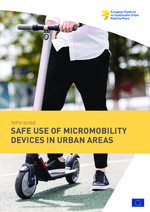New SUMP topic guide focuses on safe micromobility

Electrically powered personal mobility devices, like scooters and hoverboards, are becoming increasingly popular in cities. These modes of transportation present new challenges for urban planners and decision-makers, such as operational issues relating to safety, use of public space and traffic management.
The newest Topic Guide: safe use of micromobility devices in urban areas, aims to address these challenges by proposing best practices and key recommendations for the integration of micromobility devices in urban mobility planning, with the goal to achieve their safer use in urban areas. It also provides guidance on managing the relationship between e-mobility device users, cyclists, pedestrians and other road users; as well as recommendations on integrating micromobility into the Vision Zero approach to mobility and planning. Vision Zero aims to eliminate all traffic fatalities and severe injuries, while increasing safe, healthy and equitable mobility for all.
The Guide also considers the eight SUMP principles in the context of micromobility, such as cooperating across institutional borders, involving citizens and stakeholders, and developing all transport modes in an integrated manner.
This Topic Guide was prepared by a team of CIVITAS experts, including the Chair of the CIVITAS Policy Advisory Committee, and observers, and was shaped by an open call for stakeholder feedback. It is part of a collection of similar Topic Guides, which help European leaders forge safer mobility, and which support the European Commission to deliver on its Sustainable and Smart Mobility Strategy.
To discover the range of other SUMP topic guides, simply go to the Resources section and in the search bar type in "Topic Guide".







